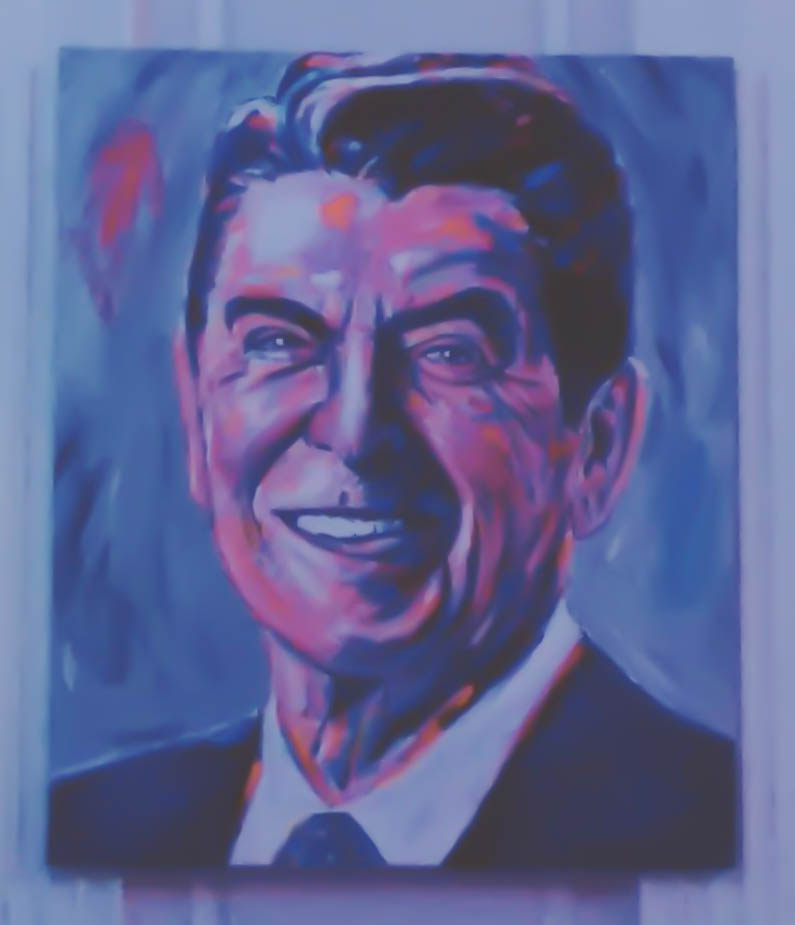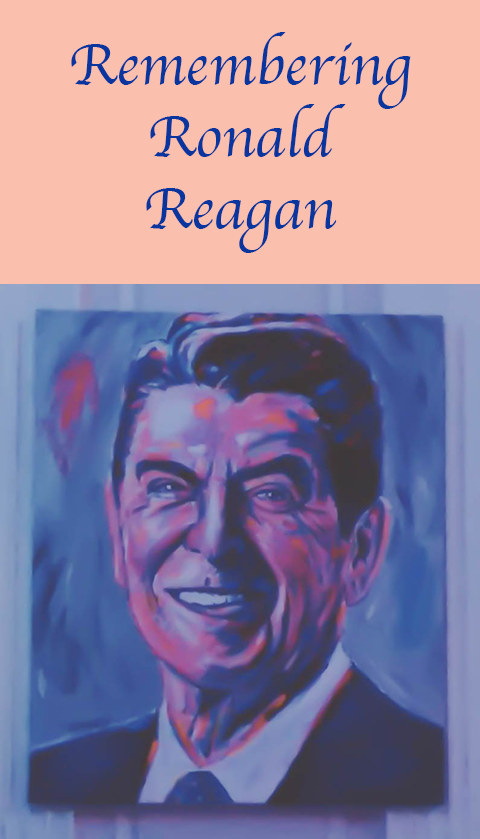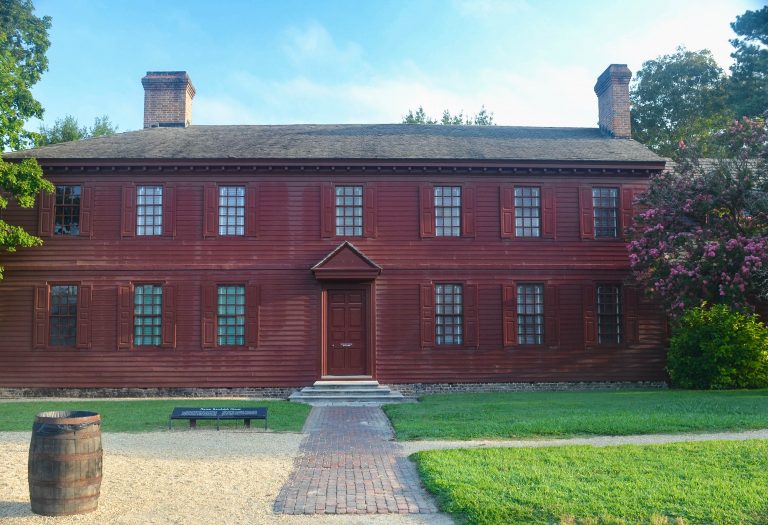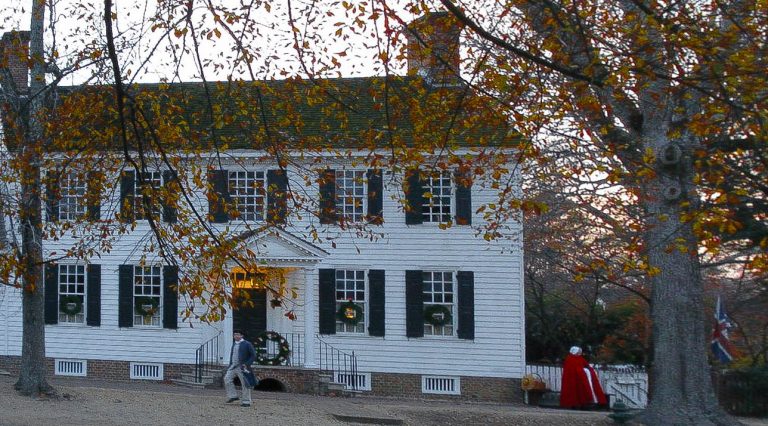Remembering Reagan

Today marks the anniversary of the passing of Ronald Reagan on June 5, 2004.
What follows is the tribute I wrote at the time:
MOURNING IN AMERICA
Families in Berlin awoke Sunday morning to the news that Ronald Reagan had “slipped the surly bonds of earth”. They were free to reach out to friends and relatives anywhere in the city for comfort—-because the Berlin Wall no longer keeps them apart.
Families in the former Soviet Union are free to seek comfort in churches—-because the Godless ideology of communism has been toppled, and the Soviet Union is no more.
Families in America, native and immigrant, live in prosperity—-because of the commonsense economic reforms of the 1980s.
All around the world, people are better off than they were 24 years ago. We’re better off because Ronald Reagan stood up to the communists and to the Congress. We’re better off because Ronald Reagan taught us to believe again in America and what she stands for—-freedom, opportunity, prosperity, and the value of every human life. We’re better off because Ronald Reagan exuded such hope that it reshaped how we saw ourselves, our country, and our world.
I met him only once. I was a young intern at Reagan-Bush ’84, his re-election campaign. The President came in for a late-October pep rally. I stood in an office doorway crowded with colleagues. He did not shake my hand. Rather, he looked into my face for a nanosecond—-and winked at me. Twenty years later, the memory of the warm smile on his face still brings a smile to mine.
I was struck by how big he was—-tall and broad-shouldered. His face was crinkled and wrinkled, as one would expect for a 73-year-old man with the hardest job in the world. But his sagging skin was pink, his smile sincere, and he exuded a vitality and a joie de vivre that made him seem younger than some people half his age.
He filled the room. It’s hard to pin down exactly how he filled it, but he did. He was big, but a lot of men are big, and few have Reagan’s presence. He had the aura of the presidency, and that’s a factor, but not the main one.
Reagan’s presence didn’t come from the mantle of the presidency or the broad shoulders on which it hung.
It came from within the man. It came from his character, and the hope that character produces.
Because of his character and his hope, he filled more than the room. He filled the decade. He created an era. His hope and optimism changed the way America saw itself. Hope was in the air in the 1980s—-a sense of renewal, a sense that the present was bright and the future brighter.
What a contrast to the decade before! It seemed that the news was all bad. The economy was in recession, brought on by stifling taxation and regulation. The Soviets invaded in Afghanistan, and the U.S. responded by boycotting the Olympics. News networks were literally counting the days that American hostages were held in Iran, and the American president announced that he wouldn’t leave the White House until they came home (a pledge he later broke).
The weak response to these harsh providences took a toll on our nation’s psyche.
Even before Reagan took office, something told us that he could make us proud again. When someone tried to shut off his microphone at a 1980 debate sponsored by his campaign, he stood up and declared, “I am paying for this microphone, Mr. [B]reen!” The microphone stayed on. The moment defined his campaign. We couldn’t imagine then that, seven years later, Reagan would speak the words that defined his presidency: “Mr. Gorbachev, tear down this wall!” We just knew that this man wouldn’t be pushed around, and, under his leadership, neither would our country.
It helped that his policies worked. An aggressive, expansionist enemy cannot be “contained”; it must be confronted. Reagan confronted the evil empire, and it crumbled. High taxes strangle prosperity; Reagan cut taxes, and the economy soared.
But his policies worked because they were rooted in truth and in hope. They were rooted in the understanding that people will soar when they are not stifled by oppressive government—-be it the pervasive, evil oppression of Godless communism, or the relatively lesser, misguided oppression of high taxes and big bureaucracy. They were rooted in what Ronald Reagan believed, and what he reminded us that we believed too.
Because Reagan’s policies worked, life improved, in America, and around the globe. And because Reagan’s exuberant optimism never failed, we believed that it would just get better and better.
Through his strength and his success, he reshaped the world. The Berlin Wall, that vast scar on the hopes of half a nation is gone—-and so is the ideology for which it stood.
Twelve years after he left office, America faced the most horrific attack on our nation and its values in our history. We did not respond with the despair that marked the 1970s. We responded with the character and spirit that were reborn in the 1980s and have never left us.
Ronald Reagan changed the world. He believed in America, and reminded us to believe in her again. And he believed that America’s values are meant to be shared with the world, and he did more to share them than anyone else.
So today, our fellow freedom-lovers in the East mourn, but they mourn in the freedom that Reagan restored to them. And we in the West, we mourn in the hope that he restored to us.

After my misspent youth as a wage worker, I’m having so much more fun as a blogger, helping other discerning travellers plan fun and fascinating journeys. Read more …






America is better off today in many ways despite Reagan, too. The Cold War ended, but not before Reagan brought us to the brink of nuclear war unnecessarily with ill-thought jokes and poorly-timed NATO maneuvers. It was Gorbachev who decided that however crazy Reagan might seem, he wasn't crazy enough to push the nuclear button — and it was Gorbachev who ordered the unilateral stand-down that ended the lengthy hostilities.
Reagan's appearing unflappable was a pleasant contrast to the times. I can't get over the feeling that while Reagan seemed so in control of his life, he didn't have a firm rein on the tiller of the ship of state.
I wasn't working at the time this happened, so I watched a TON of coverage and just bawled throughout the funeral/memorial ceremonies. Despite that he'd been out of the spotlight for a long time already by then, it still felt like a tremendous loss for our country.